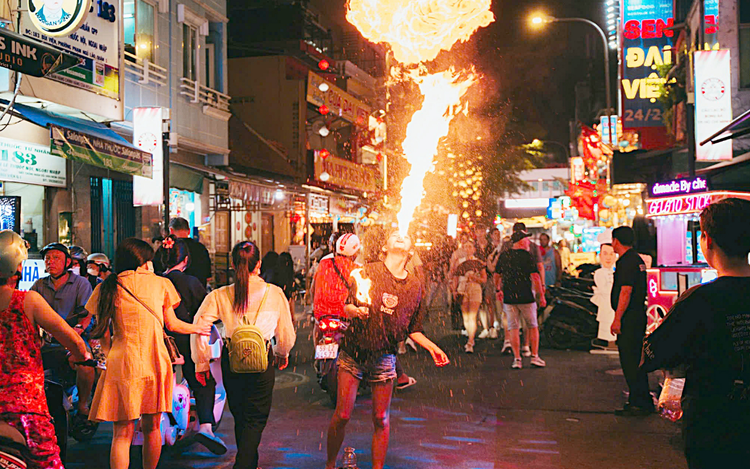
A girl performs a fire-breathing act for money on Bui Vien Street in Ho Chi Minh City. Photo: Thanh Hiep / Tuoi Tre
At the heart of the problem lies an exploitative system: professional beggar rings that prey on public sympathy and compassion, with many of them orchestrated by individuals or groups who manage beggars for profit.
Children are forced to wander busy intersections under the scorching sun to beg for money, while disabled individuals are instructed to sell cotton swabs on sidewalks.
These people have even entered restaurants, markets, and narrow residential alleys.
Young boys and girls who should be in school choose to perform fire-breathing acts at traffic lights or eateries for money.
Some individuals go so far as to feign illness, disability, or financial crisis to solicit cash from passersby.
In some cases, some generous donors are later shocked to encounter beggars eating at upscale restaurants or counting large sums of money in hidden corners.
Stories exposing child exploitation and forced begging among the disabled have sparked outrage.
While countless well-meaning residents, including workers and students, continue to hand out small sums to beggars on the streets, ironically, their daily earnings may pale in comparison to the income amassed by the beggars, and by extension, their handlers.
By giving money to street beggars, the public unintentionally fuels the beggar rings.
Many people think it is just a small donation, and prefer to give rather than risk ignoring someone in genuine need.
However, as long as money continues to flow, the exploiters will not stop.
It is necessary to break this cycle starting with each resident by refusing to donate money to individuals stationed at intersections or along streets.
Tougher measures needed
In Ho Chi Minh City, digital sign boards at intersections remind commuters not to give money to beggars, showing a promising step toward broader change.
People are urged to report suspected cases of organized begging to local authorities to prevent the physical and psychological exploitation of vulnerable individuals, and promptly assist those who are truly in need.
It is vital to issue stronger welfare policies, set up social support funds, enhance cooperation between urban management units and local patrols, and provide homeless or at-risk individuals with shelters where they can be properly cared for.
Donations and aid should be channeled through credible government-supported charities and institutions rather than handed out on the street.
Under the government’s Decree 130, only cases involving children being forced to beg are subject to administrative penalties.
There is no regulation that stipulates any sanctions against the organized control of adult beggars.
This gap needs urgent attention.
Eliminating organized begging requires a detailed, long-term, and resolute strategy that must hinge on consistent collaboration between residents and local authorities.


Max: 1500 characters
There are no comments yet. Be the first to comment.